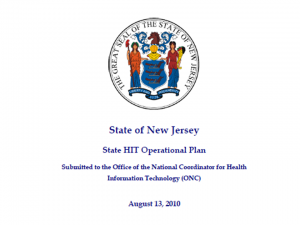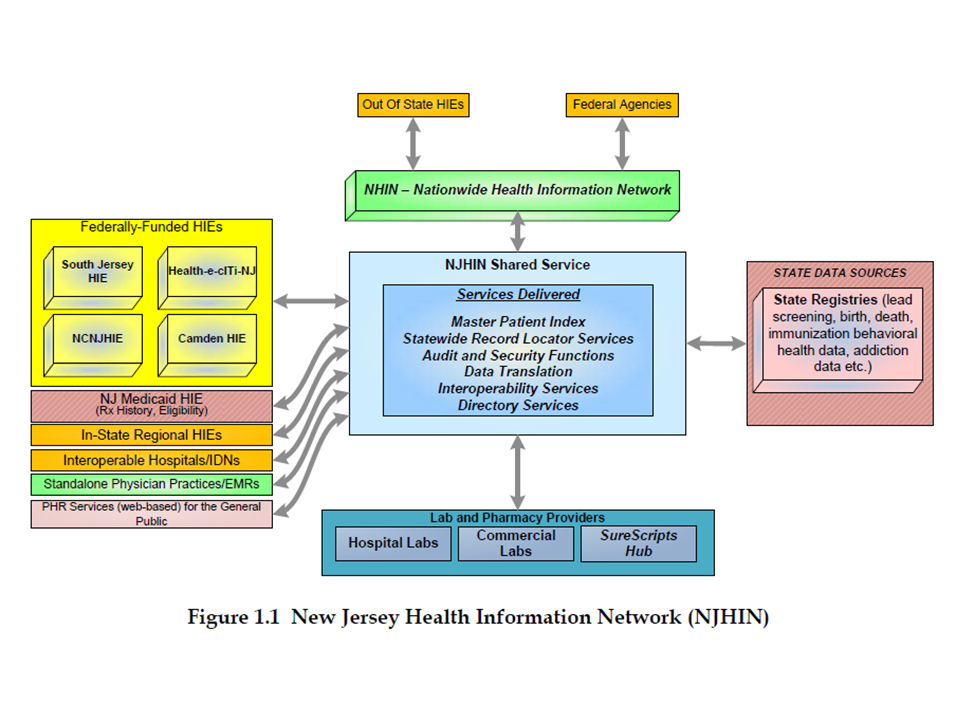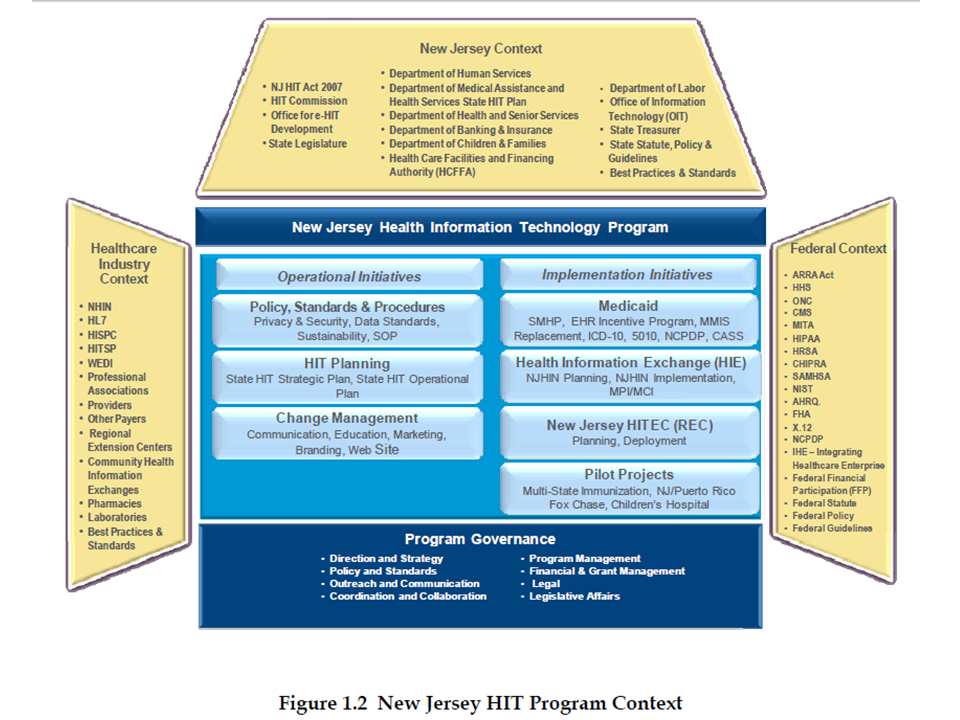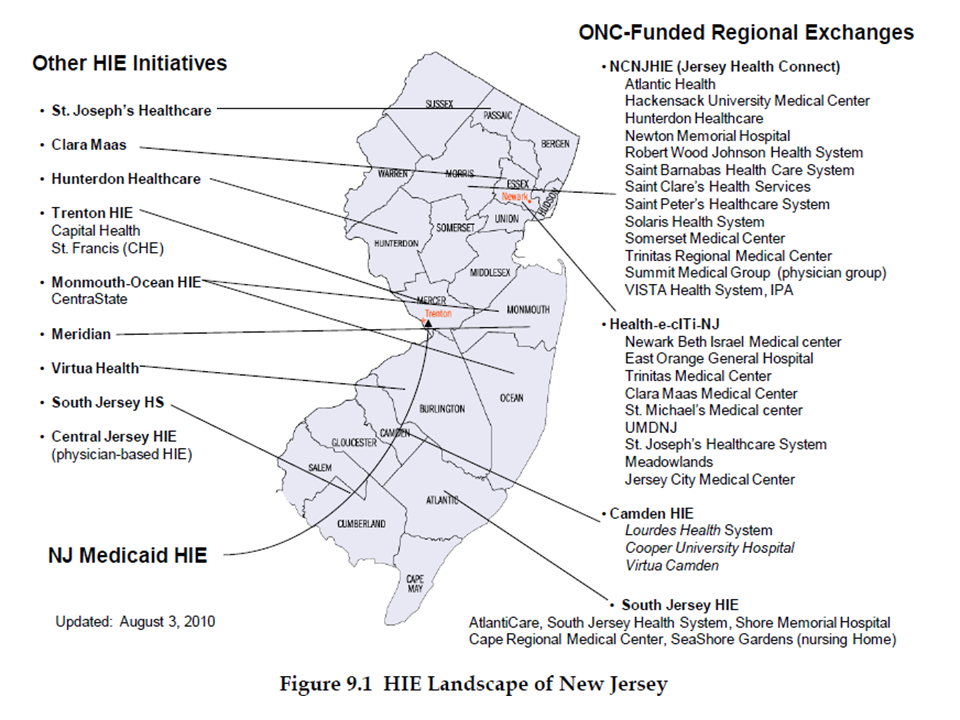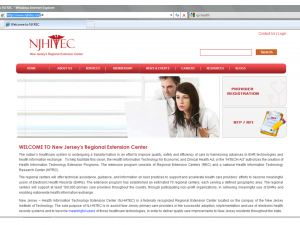New Jersey HIT Commission and the Office for e-HIT Development Joint Interim Report
July 2010
The Interim July 2010 report for New Jersey HIT Commission and the Office for e-HIT Development was accessed on the New Jersey Health IT Commission Web Page on July 27, 2010. The report’s preface, executive summary, introduction and report scope, and accomplishments sections are excerpted below.
For the full report in PDF format click here

- NJ Health IT Commission
or
go the the NJ HIT Commission Web site.
Preface
The Health Information Technology Commission, in collaboration with the Office for e-HIT Development, is statutorily obligated to submit an Interim Report to the Governor and the Legislature. The material in this report reflects the continued work in the priority areas of the New Jersey Health Information Technology Commission as determined by the Commission members with input from the Office for Electronic Health Information Technology (e-HIT) Development and the rapidly-changing national landscape of health IT.
Executive Summary
The Health Information Technology Commission was formed by the “New Jersey Health Information Technology Act,” signed into law by Governor Corzine in January, 2008. (A4044/S2728; PL 2007, Chapter 330). Under the law, the Commission and the Office for e-HIT Development in the Department of Banking and Insurance are responsible for collaborating to “develop, implement, and oversee the operation of a Statewide Health Information Technology Plan.”
The Commission is composed of key leaders from the private and public sectors representing the variety of services that compose the New Jersey Healthcare environment. The Commission held its first full meeting in December 2008.
In July, 2009 the Commission realigned its effort in order to respond to the American Recovery and Reinvestment Act of 2009 (ARRA), which contains funding under Part 3010 for the establishment of interoperable systems for Health Information Exchange (HIE). Working with leaders throughout the state, New Jersey submitted a proposal to create four regional health exchanges, for which we received approval in March 2010, resulting in a notice of grant award for $11.4 million.
Also in July, 2009 the Commission voted to form three Committees to develop and track recommendations regarding the important areas of emphasis for the state: Implementation, Policy, and Technology. Each of these committees has completed its first phase and made preliminary recommendations to the full Commission. Efforts to further delineate and refine the recommendations are currently under way. The Commission has also synthesized a variety of reports from both the private and public sectors to better define the healthcare landscape and needs of the residents of New Jersey.
The Health Information Technology Commission, in collaboration with the Office for e-HIT Development, is statutorily obligated to submit this Interim Report to the Governor and the Legislature “concerning its activities and the status of, and actions taken regarding development, implementation, and oversight of the statewide health information technology plan.” The material in
this report reflects the continued work in the priority areas of the New Jersey Health Information Technology Commission as determined by the Commission members with material contribution from the Office for e-HIT Development and the rapidly-changing national landscape of health IT.
Over the past year and a half, the NJHITC has collected, reviewed and integrated a variety of reports and plans in existence throughout the state including the Rutgers HIT Landscape Report commissioned by the Office for e-HIT Development assessing the current state of electronic healthcare information systems, and the Regional Health Exchange Feasibility Study and Model for
creating a state wide HIE commissioned by the New Jersey Hospital Association. The NJHITC addressed the issues pertinent to emergency preparedness through a review of Hippocrates, New Jersey’s state of the art, real-time, electronically integrated emergency preparedness response system program. The NJHITC and Office for e-HIT Development also reviewed the New Jersey Department of Health and Senior Services’ plan to rollout technology to Federally Qualified Health Centers, the meaningful use criteria defined by ARRA HITECH regulations, and plans to create an interstate immunization registry with New York and Pennsylvania.
These projects serve as a background for the overall statewide plan. In addition the Commission and the Office for e-HIT Development worked with the Camden Coalition to explore process improvements in health quality and cost savings in underserved urban communities through robust health data collection. The subcommittee on Policy ran a public forum and synthesized a manual of privacy policy needs and recommendations, as well as completed a preliminary analysis of Selected
New Jersey Confidentiality and Patient Approval Regulations attached to this Report as Appendix D.
The Implementation subcommittee assembled sound recommendations for the implementation of technology in physician offices and outlined best practices for implementing health information technology. The Technology subcommittee formed recommendations for standards and infrastructure which are the groundwork for moving the plan forward.
All of this effort afforded the Commission the opportunity to contribute to the ARRA grant funding effort, and facilitate attainment of the grant award by the State of New Jersey.
As we move forward, the Commission subcommittees will further develop recommendations and advance the statewide HIT plan along with the guidelines offered by our federal partners. To encourage continued progress, the Commission will maintain focus on the following foundations for success:
Foster the quality of care
Protect the privacy of individual health information
Ensure the accuracy of health data
Encourage innovation
Incorporate all healthcare related entities
Introduction and Report Scope
The acquisition and deployment of Health Information Technology (HIT) and Health Information Exchange (HIE) throughout the healthcare system(s) in New Jersey offer a momentous opportunity to make substantial progress in improving the health of our citizens. The direct benefits include: improved patient safety and healthcare quality, enhanced public health, healthcare cost reduction, improved access to care, and greater consumer engagement and empowerment. It is vitally important
that the State of New Jersey have a strategic vision for both the implementation of information technology and a system of connectivity that will provide for the free exchange of information among providers throughout the state. Health IT is a pillar of our healthcare system—and will be increasingly central to health-care reform.
This Interim Report provides a landscape summary of health IT, a description of long-term goals, initiatives undertaken to date regarding the state plan and its implementation — including the state’s successful ARRA grant application — and recommendations to help achieve those goals. Working with other state agencies, on Oct. 16, 2009 the Commission submitted to the federal Department of Health and Human Services a State Plan in conjunction with a grant opportunity through the American Recovery and Reinvestment Act for the creation of a statewide Health Information Exchange (HIE). The HIE is one component for a state-based model of digital healthcare. The detailed State Plan is available at the Commission’s web site: http://www.nj.gov/health/bc/hitc.shtml.
Our ARRA grant submission was approved for the “Strategic” aspects of our State Health IT Plan ad as a result, the State received a notice of grant award in the total amount of $11.4 million. The tate has received $1 million of the total award for planning activities, but as with 48 other states, the ederal agency is requiring that the State Plan be in full compliance with all requirements before the
remaining “Implementation” funds are released. This will require that certain points in the State Plan be modified or clarified, as described below.
This interim report represents a review of a process that will continue to evolve over time. Thus, it is both a “look back” and a projection of “future activity.” The transformation of the healthcare system in New Jersey from a paper based health care environment to a digital health care environment is complex and will require collaboration across multiple parties with potential conflicting interests. It is our belief however that working together with public and private parties the State can sustain the
effort to accomplish the transformation and provide access to reliable health care information that improves the quality and efficiency of care.
Working with the Office for e-HIT Development, and the Division of Medical Assistance and Health Services, the New Jersey Health Information Technology Commission (NJHITC) is addressing a broad scope of critical components and workflows in building the blueprint of a statewide health information technology network. These two entities continue to plan a strategy to deploy electronic
health records in physician offices, federally qualified health centers, long term care facilities, hospitals, home health agencies, and other health care delivery settings and connect them electronically to laboratories, pharmacies, state registries, and payers. The Commission also recognizes the valuable role technology will play to enable the optimal use of health care data for clinical research, to improve public health outcomes, and to improve the process and outcomes of patient care in New Jersey. This report focuses on the opportunities and challenges to clinical data exchange at the community and state level and to the adoption of HIT. The American Recovery and Reinvestment Act’s HITECH provision and subsequent funding programs prompted the NJHITC and Office for e-HIT Development to focus their attention on developing a plan for health information exchange so that the State of New Jersey could procure the maximum funding for such activities allowed by federal legislation. The Health Information Exchange is the cornerstone of an overall statewide plan but is not the only aspect of the plan that the NJHITC and the Office for e-HIT Development are working on. It is the intent of the two entities to issue interim reports on an ‘as needed’ basis to inform the
Governor and the Legislature of the State of New Jersey of the ongoing progress to achieve the vision of a statewide HIE and other aspects of the health IT plan.
Accomplishments
The following table provides a list of recent Health Information Technology (HIT) accomplishments by the State of New Jersey. These accomplishments contribute to the state’s overall HIT program vision, a foundation upon which the state’s health information program will be built and transformed to enable the exchange of Electronic Health Records (EHRs) and improve health outcomes statewide.
The HIT accomplishments table is divided into six focus sections that represent key foundational areas necessary to build a successful statewide HIT program. They are as follows:
• Organization and Governance – This area addresses recent organizational changes and project governance now in place to lead and govern HIT for the state.
• Transformation Planning – This section provides further details on the plans and funding that has been secured to initiate HIT planning activities and supplement HIE technology infrastructure needs.
• Technology and Business Transformation – This area includes several major in-process initiatives to support federal directives to address HIPAA compliance and other major improvements.
• Health Information Exchanges – This area lists all active New Jersey HIEs that have been established, each addressing their specific geography and local patient and physician needs.
• Implementation and Transformation Support – This section includes accomplishments to support HIT implementation and sustain program efforts going forward.
• National Involvement – This section includes communication and coordination of activities with other states, participation in national events to share and exchange HIT related best practices and lessons learned.
Health Informatation Technology
ACCOMPLISHMENTS (Excerpted from table)
FOCUS: Organization & Governance
Initiative: HIT Commission
Accomplishment: The HIT Commission established four subcommittees to focus on core areas of HIT implementation and provide recommendations as the state moves forward with its HIT strategy.
• Policy (including Privacy issues)
• Implementation
• Technical Infrastructure
Initiative: HIT Medicaid Strategy & Health Care Reform Focus
Accomplishment: The State has recognized the importance of Medicaid in the overall State HIT program as well as the need to embrace healthcare reform in the state’s HIT vision and strategy planning. A new Executive Director role has been created within the Department of Human Services to focus specifically on the Medicaid State HIT Plan (SMHP) and analyze recent healthcare reform impact on the overall HIT program. The Executive Director will work in close coordination with the State’s HIT Leader.
Initiative: HIT Leadership
Accomplishment: The State has recently created an HIT office and Leader position as part of the Governor’s office. This role will have the responsibility of directing and coordinating all HIT activities across the state. A statewide governance structure will be established and this new office will work in conjunction with the Office for e-HIT within the Department of Banking and Insurance
and the HIT Commission.
Initiative: Electronic Data Sharing Agreements
Accomplishment: Nationally recognized and accepted standard electronic data share agreements were developed and put in place between states. This was endorsed by the National Coordinator for Health IT, CDC and the
American Immunization Registry Exchange.
Initiative: Accreditation Requirements to Protect Citizen Health Information
Accomplishment: DOBI and Office for e-HIT now requires the accreditation of national healthcare clearinghouses, third party billers and third party administrators handling any New Jersey protected health information as to HIPAA and State privacy and security laws, regulations and business practices. This will ensure that the protected health information of our citizens is safe
and secure.
FOCUS: Transformation Planning
Initiative: NJ State HIT Plan
Accomplishment: The state submitted a statewide planning and implementation plan to the Office of the National Coordinator in response to funds available through the American Recovery and Reconciliation Act. The plan effectively established a foundation that leverages 4 Regional Health Information Exchanges, covering the entire state that would implement electronic health records with a ‘bottom-up’ approach. The plan also uses Medicaid as a key partner and leverages CMS funding to build the
infrastructure for statewide HIE.
Initiative: State Medicaid HIT Plan
Accomplishment: The State Medicaid HIT Plan (SMHP) establishes the road map for how the Medicaid agency will promote the use of HIT and electronic health records (EHRs) among Medicaid providers. The first phase of this project is nearing completion, with the delivery of a current landscape assessment, and will be followed by the development of a vision and a set of strategies to drive
the road map. The landscape assessment is a current view of New Jersey’s HIT maturity and will also be leveraged to develop a statewide HIT vision and plan.
Initiative: Funding Received – Planning
Accomplishment: The state received $4.92M from Centers for Medicare and Medicaid Services (CMS) to support the State Medicaid HIT Planning (SMHP) effort.
Initiative: Funding Received – HIEs
Accomplishment: The state received $11.4M from the Office of National Coordinator (ONC) for HIT to support four approved regional HIEs.
Initiative: Funding Received – Regional Extension Center (REC)
Accomplishment: NJIT received more than $23M from ONC to support REC planning and initial implementation support including awareness, training and education. The newly formed REC is called NJ-HITEC, New Jersey Health Information
Technology Extension Center.
FOCUS: Technology & Business Transformation
Initiative: Technology & Master Patient Index
Accomplishment: This project (started in March 2010) will enable the New Jersey Division of New JerseyMedical Assistance & Health Services (DMAHS) to reliably and accurately maintain a single unique beneficiary identity within the Medicaid enterprise, while also linking Medicaid beneficiary records across various information systems. This will promote the critical interoperable exchange of Medicaid, Immunization and Blood Lead Screening databases among New Jersey’s departments of Health and Senior Services and Children and Families, Managed Care Organizations, FQHC Providers, Hospitals and the Department of Human Services.
Initiative:Immunization Registry Data Exchange
Accomplishment: Electronic exchanges of immunization registry data between States led by the Office for e-HIT between NJ and many other states. This has become the model for a national public health registry data exchange that is being established by the various Health Information Exchanges (HIEs) around the country. (Italics in text refer to corrections.)FOCUS: Health Information Exchanges
Initiative:
Camden Coalition*
Health-e-ciTi*
Northern & Central HIE*
South Jersey HIE*
Clara Maass
Central Jersey HIE
MOHIE
Trenton HIE
Virtua HIE
(*Current ONC funded HIE’s)
Accomplishment: Implementing the HIE infrastructure enables the exchange of health information among the health care organizations and encourages improved efficiency and quality of care. Several HIE’s within New Jersey are in various stages of implementation. Significant accomplishments have been made over the last year including four of the HIEs receiving funding from ONC (indicated by the *). A Roadmap for Statewide Implementation was submitted to the Office of the National Coordinator in May 2010.
Initiative: Mid-Atlantic States – HIE
Accomnplishment: NJ e-HIT has established, at the request of ONC, a preliminary mid-Atlantic states health information exchange involving NJ, NY, PA, DE, MD, DC and VA.
FOCUS: Implementation & Transformation Support
Initiative: Sharing Medication History
Accomplishment: NJ Medicaid began sharing medication history data with the Health-e-ciTi HIE in March 2010.
Initiative: Regional Extension Center (REC)
Accomplishment: NJ-HITEC will support HIT implementation throughout the state including HIT related awareness, training and education. William O’Byrne, former State Coordinator, Office for Electronic Health Information Technology Development, has since retired from the state and has become the REC Executive Director.
Initiative: Stakeholder Analysis
Accomplishment: Excluding patients, there are more than 100,000 entities in New Jersey who are potentially involved, influence, or are impacted by HIT. It is critical to understand the stakeholder involvement and impact throughout the planning and implementation of the HIT program. The goal of the stakeholder analysis is to provide a strategic view of the human and
institutional landscape, and the relationships between the different stakeholders and the issues they care about most.
FOCUS: National Involvement
Initiative: Multi-State Collaborative
Accomplisment: New Jersey has been an active participant in multi-state calls sponsored by CMS to share and exchange HIT best practices, lessons learned, etc. New Jersey is also planning its own multi-state collaboration event with participation from 2-3 nearby CMS regions to further exchange and share information.
Initiative: MMIS 2010 National Conference
Accomplishment: State of New Jersey is participating and presenting on several topics related to HIT, HIE and SMHP at the 2010 MMIS National Conference in Portland, Oregon, mid August.
ADDITIONAL SECTIONS OF REPORT
AVAILABLE IN FULL PDF
Challenges and Opportunities
Status
Core Recommendations
Sub Committee Recommendations
Principles of HIE Governance
Principles of Sustainability
Principles of Privacy and Security
Conclusions
Appendices
A – Glossary of Terms
B – Guiding Principles for a Health Information Exchange
C – Use Case Matrix Scores
D – Analysis of Selected New Jersey Confidentiality and Patient
Approval Regulations



